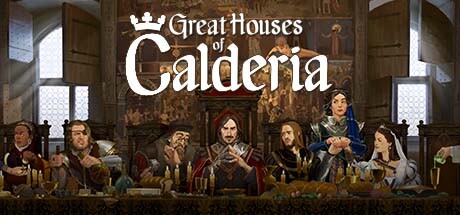In today's devblog, we'll tackle social conflicts and how they play a pivotal role in your nobles' lives. Social conflicts are common in Calderia and part and parcel of diplomacy. Each House has its own interests and plans. They lead to negotiations where your characters and companions' skills will help you choose the outcomes that are most advantageous to you.
Understanding social conflicts
Unlike military battles, where victory might be more straightforward, social conflicts involve negotiation "fields" in the form of boards where you place your character and companions. The board is made of nodes and paths that represent verbal sparring that you must win by conquering the nodes. When characters or companions meet, they argue until one of them backs away. You and AI alike can prioritize specific topics, making negotiations more intricate and goal-oriented. These conflicts can include trade, marriage, and peace negotiations, for instance.

Impact of family members and companions
Family member characteristics and abilities
Each family member possesses basic stats like "attack" and health, influencing their strengths in negotiations. Additionally, personality traits grant them extra abilities, some passive and others active. These abilities, ranging from automatic impacts to temporary boosts, significantly affect conflict dynamics and make your family member a determining part of the negotiation.
Role of companions
Companions, representing the household staff, are useful assets in social conflicts. They are unlocked through fiefdom upgrades and accompany family members in negotiations. When starting a negotiation, you will have to choose which ones will take part in the social conflict. Higher-tier companions possess stronger abilities, better health, and "attack" values. They are all specialized in one of the four following skills: Diplomacy, Economy, Intrigue, or Military.

Dynamics and outcomes of social conflicts
Negotiation dynamics
During social conflicts, the selection of companions and their abilities influence negotiation outcomes. Companions may leave negotiations due to depleted health or nerves to rest, impacting the negotiation process. If they have good composure (symbolized by the heart icons), then they can return to the negotiations shortly after resting. However, if they are out of hearts, they cannot return to the board of the current conflict anymore.
Long-term effects
Successfully managing social conflicts grants various benefits, including traits, skills, and Tradition points. These outcomes make your House and characters more skilled for future negotiations. In summary, social conflicts are part of the diplomatic depth we wanted to develop. Choose the family members and companions you will use to solve them carefully so you can talk your way to the most profitable outcome.

And that concludes our devblog for today. Understanding the dynamics, stakes, abilities, and skills of social conflicts is part of your journey to become the most powerful House in Calderia!
Want to contribute to the game's improvement? You can do so by sharing your feedback and suggesting what you'd like to see in the game on our Discord or Steam forums!
- Great Houses of Calderia Team -
